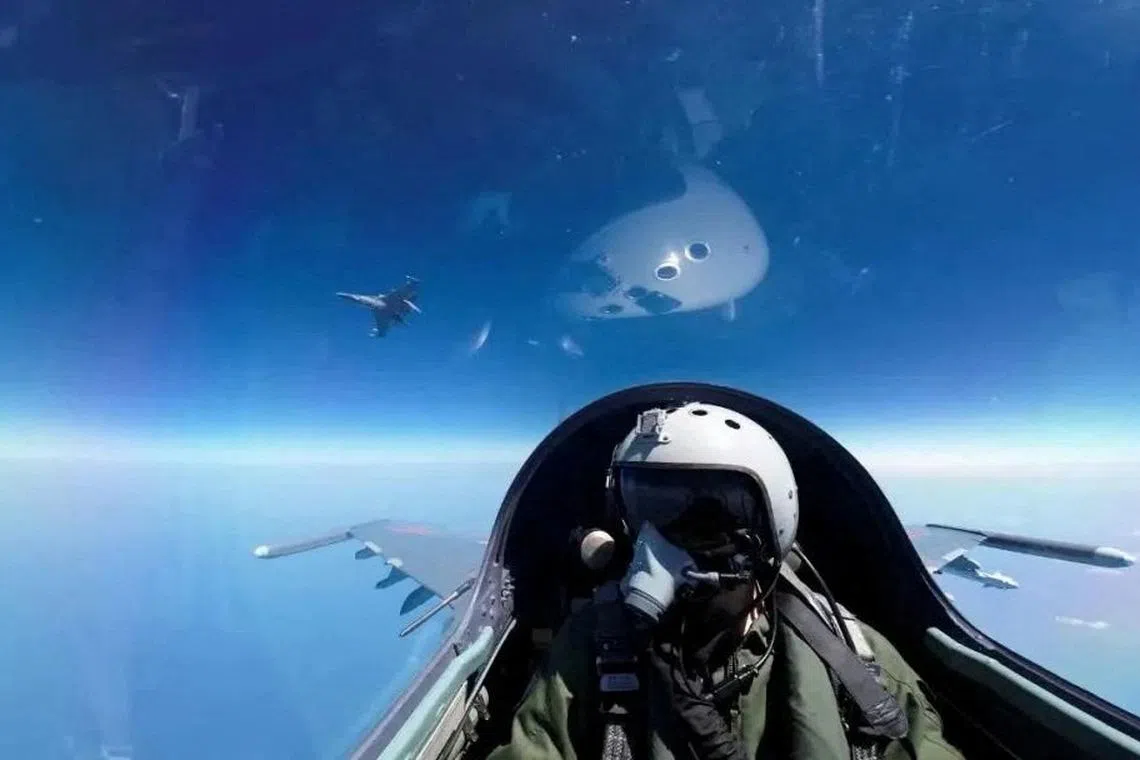China warns Taiwan independence and peace are ‘mutually exclusive’ as military drills conclude
Sign up now: Get ST's newsletters delivered to your inbox
Follow topic:
TAIPEI – China warned on Monday that peace in the Taiwan Strait and independence for Taiwan were “mutually exclusive”, as its military said it had “successfully completed” exercises around the island following three days of war games.
“Taiwan independence and Taiwan Strait peace and stability are mutually exclusive things,” Chinese Foreign Ministry spokesman Wang Wenbin told a regular briefing, adding: “If we want to protect peace and stability in the Taiwan Strait, we must firmly oppose any form of Taiwan independence separatism.”
China ended its military drills around Taiwan on Monday, saying it had tested integrated military capabilities under actual combat conditions, having practised precision strikes and also blockading the island Beijing views as its own.
Taiwan’s Foreign Ministry condemned China for undermining “peace and stability”.
Though the drills have ended, Taiwan will not stop strengthening combat preparedness and continue to pay close attention to China’s missiles force and movements of the Shandong carrier, the island’s Defence Ministry added on Monday.
The Chinese military said it had “successfully completed” the exercises and “comprehensively tested” the capabilities of multiple units.
“The troops in the theatre are ready to fight all the time and can fight at any time, resolutely crushing any form of Taiwan independence separatism and foreign interference,” the Eastern Theatre Command of the People’s Liberation Army said.
China announced the three days of drills
China regards Taiwan as a renegade province to be reunified with it, by force if necessary.
Chinese state television said aircraft, including nuclear-capable H-6 bombers armed with live missiles, and warships staged drills to “form a multi-directional island-encompasing blockade situation”.
“In the Taiwan Strait, the north-west and south-west of Taiwan and the waters east of Taiwan, (Chinese forces) took the initiative to attack, giving full play to their performance advantages, flexibly manoeuvring to seize favourable positions, and advancing at high speed to deter opponents,” the report said.
The Eastern Theatre Command of the People’s Liberation Army said the aircraft carrier Shandong also took part in combat patrols, and showed fighters taking off from its deck.
Taiwan has been tracking the Shandong since last week in the Pacific Ocean.
Taiwan’s Defence Ministry published a map on Monday of the previous 24 hours of Chinese air force activities, showing four carrier-based Chinese J-15 fighters operating over the Pacific Ocean to Taiwan’s east.
The ministry said it had spotted 91 military aircraft and 12 ships around Taiwan as at 6pm on Monday, and that the Shandong carrier group was drilling in the Western Pacific.
The Shandong conducted air operations in waters close to Japan’s Okinawa islands on Sunday, Japan’s Defence Ministry said on Monday.
Jet fighters and helicopters took off from and landed on the carrier 120 times between Friday and Sunday, with the carrier, three other warships and a support vessel coming within 230km of Japan’s Miyako island, the ministry said.

PHOTO: REUTERS
Japan has been following China’s military drills around Taiwan “with great interest”, Chief Cabinet Secretary Hirokazu Matsuno said on Monday.
“The importance of peace and stability in the Taiwan Strait is not only important for the security of Japan, but also for the stability of the international community as a whole,” he told reporters.
The country has long worried about China’s military activities in the area, given how close the southern Japanese islands are to Taiwan.
Okinawa hosts a major US air force base, and last August, when China staged war games to protest against the visit of then US House Speaker Nancy Pelosi to Taipei, Chinese missiles landed within Japan’s exclusive economic zone.
The United States has said it is also watching China’s drills closely.
China’s military simulated precision strikes against Taiwan
The Eastern Theatre Command on Monday released a short video on its WeChat account showing an H-6 bomber flying in what it said was the skies north of Taiwan.
“The missiles are in good condition,” an unidentified voice says, as the video shows images from the cockpit.
“Start the fire control radar, lock on the target,” another voice says, showing images of a missile under the aircraft’s wing.
It then shows a pilot readying the fire control button for what it describes as a simulated attack, and pressing the button, though it did not show any missiles being fired.

A pilot operating an aircraft under the Eastern Theatre Command of China’s People’s Liberation Army during the combat readiness patrols and “Joint Sword” exercises around Taiwan.
PHOTO: REUTERS
Taiwan’s military has repeatedly said it will respond calmly to China’s drills and not provoke conflict.
China’s military drills were on a par with the reaction last year after Mrs Pelosi visited the island,
Life in Taiwan has continued normally with no signs of panic or disruption, with civilian flights operating as usual.
“Most normal people probably aren’t afraid, with the main reason being that everyone thinks that China will certainly not start a war,” said retiree and former soldier Tang Pao-hsiung, 78.
Taiwan’s stock market brushed off the tensions, with the benchmark index up around 0.2 per cent early on Monday afternoon. REUTERS


